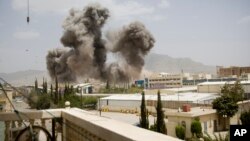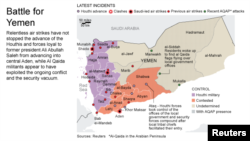The United Nations Security Council has approved an arms embargo on the leaders of Yemen's Shi'ite Houthi rebels and demanded the group withdraw from the capital, Sana'a, and all other territory it has captured.
The Council voted 14-0 on a resolution Tuesday, with Russia abstaining.
The measure drafted by Jordan and Arab Gulf countries also would impose a travel ban and an asset freeze on rebel leader Abdul-Malik al-Houthi and Ahmed Ali Abdullah Saleh, the son of Yemen's former president who supports the Houthis.
The Council has already imposed those bans against the former president and two senior Houthi leaders. The new resolution places the arms embargo on all five men.
It was not clear ahead of the vote whether Russia would use its veto power as one of the five permanent Security Council members to block the measure. Russia argued that the arms ban should apply to all parties in the conflict that has pitted the Houthis against forces backing the internationally recognized president, Abd-Rabbu Mansour Hadi.
A Saudi-led coalition has been carrying out airstrikes against the Houthi rebels.
Also Tuesday, the al-Qaida's arm in Yemen announced that its top cleric, a Saudi-national who has had a $5 million bounty on his head, has been killed.
Al-Qaida in Yemen, formally known as al-Qaida in the Arabian Peninsula, announced on Twitter Ibrahim al-Rubaish was killed by a U.S. drone strike.
Al-Rubaish was released from the U.S. prison at Guantanamo Bay, Cuba in 2006, after which he joined al-Qaida in Yemen. He was considered the group's the main ideologue and theological adviser and his writings and sermons were prominent in its publications.
On Monday, the aid group Doctors Without Borders said it airlifted 15 tons of supplies into Sana'a and was working to establish additional supply routes by sea to the southern port city of Aden.
The head of the group's mission in Yemen, Marie-Elisabeth Ingres, said moving the supplies into Yemen is only the first step.
"Getting aid into the country is only part of the challenge," said Ingres. "Due to the fighting and insecurity within Yemen, we are also facing difficulties assessing the needs and deploying staff and supplies to the areas where the needs are greatest."
The fighting in Yemen has killed more than 600 people and forced 100,000 people from their homes.







